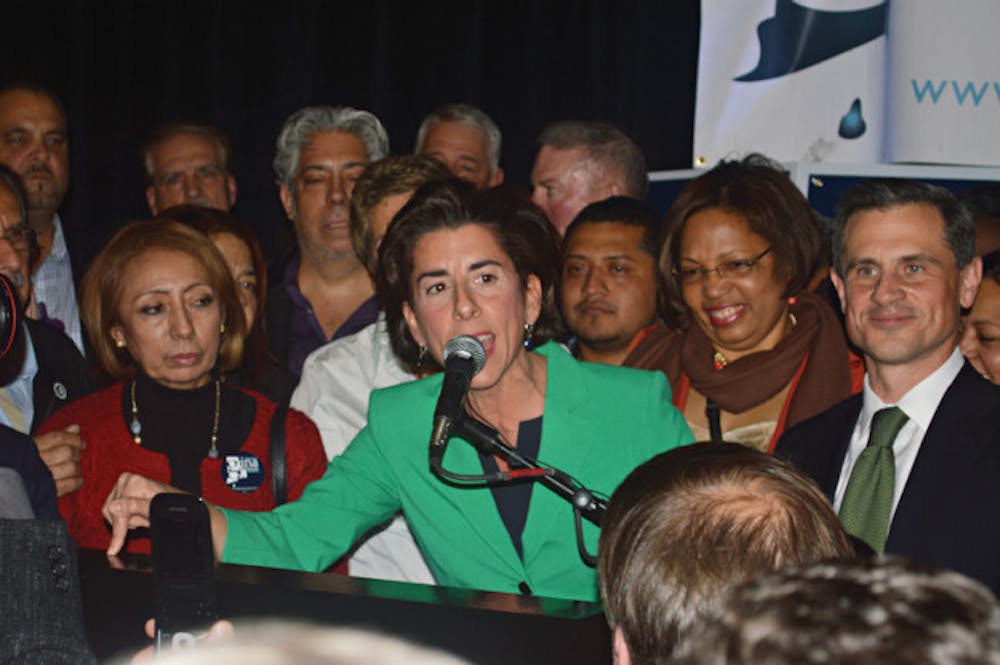Democratic gubernatorial candidate Gov. Gina Raimondo has announced that she will realize an initiative to fund universal state pre-kindergarten if she is elected for a second term. The announcement was made in a preschool classroom in Pawtucket’s Heritage Park YMCA Sept. 10, two days before Raimondo defeated Matt Brown and Spencer Dickinson in the primary.
“Investing in pre-K is about improving K-12 education in Rhode Island. Pre-K is the most cost effective way to make significant improvements in K-12 outcomes,” wrote Communications Director of the Rhode Island Democratic Party Emily Samsel in an email to The Herald.
Raimondo’s plan would add approximately 70 state pre-K classrooms per year over a five-year period, totaling about 6,000 additional seats for four-year-olds, according to a video of the announcement. Expansion on this scale would mean nearly a 600 percent increase in the number of seats available.
As of September 2018, Rhode Island offers 1,080 state-sponsored pre-K spots, which are distributed across the 11 of Rhode Island’s 47 school districts with the highest rates of low-income students: Central Falls, Cranston, East Providence, Johnston, Newport, North Providence, Pawtucket, Providence, Warwick, West Warwick and Woonsocket. Among eligible students, there was a state pre-K waitlist of approximately 750 students this year, wrote Rhode Island Department of Elementary and Secondary Education Communications Director Meg Geoghegan in an email to The Herald.
Raimondo estimated that, though expansion would cost $15 million per year, the initiative would “(save) a lot of money down the road,” she said in the announcement. In her email to The Herald, Samsel also cited a study suggesting universal pre-K might save $126 million in pre-K through grade 12 education funding by 2030.
Rhode Island’s expanded state pre-K program would continue to follow a “blended model” that allows community centers and early childcare centers to compete with public schools for grants to fund pre-K classrooms, wherein grants for setting up pre-K classrooms are awarded to the programs that best demonstrate their ability to meet the state’s quality requirements.
Rhode Island first created a state-funded pre-K program in 2009, which served 126 students, according to the Rhode Island Department of Education website. In 2014, Rhode Island received a $19 million federal grant to expand state pre-K over the course of four years from 17 classrooms serving 306 children to 60 classrooms accomodating 1,080 students. “We knew that this would be the final year of scaleup” funded by the federal grant, Geoghegan said.
Whereas the existing state pre-K program received both federal and state funding, Raimondo’s proposed pre-K expansion would be solely funded by the state budget, Geoghegan wrote.
The Rhode Island pre-K program ranks among the best in the country. “There are three times more four-year-olds from low income communities participating in Rhode Island’s public pre-K program today than when the Governor first took office,” Samsel wrote. Rhode Island was ranked 19th for state spending and fourth for overall spending on pre-K education, according to the State Preschool Yearbook 2017 published by the National Institute for Early Education Research. The report also shows that Rhode Island is one of only three states whose pre-K program meets every NIEER benchmark, earning it a 10/10 quality ranking.
Expanding the pre-K program “is a policy that makes a lot of sense from both an economic and a policy perspective,” said Elizabeth Burke Bryant, executive director of the educational non-profit Rhode Island KIDS COUNT.
While R.I. KIDS COUNT does not endorse candidates, the non-profit would strongly favor implementing Raimondo’s proposal. “Rhode Island KIDS COUNT has been a strong supporter of state pre-K for a number of years because we know what a difference it makes in leveling the playing field,” Burke Bryant said.
In explaining the longstanding consistency of her commitment to early childhood education, Raimondo referenced her focus on expanding access to all-day kindergarten during her first term: “The first thing I did as governor is bring about all-day kindergarten, for every student in every public school in Rhode Island.” Prior to her initiative, “about 25 percent of kids in Rhode Island didn’t have access to all-day kindergarten,” she added. If the program were realized, Raimondo would expect approximately 70 percent of eligible students to take advantage of it.
Raimondo is “sure there will be resistance” to the proposal, especially from those who would consider it too expensive. Both Geoghegan and Burke Bryant suggested space might also pose a challenge to the initiative. It will be necessary to “ensure that there are adequate facilities available,” Burke Bryant said.
Raimondo’s opponents’ perspectives on universal pre-K vary.
Cranston mayor and Republican gubernatorial candidate Allan Fung disagreed with the initiative and called it a “political Hail Mary,” according to the Providence Journal.
Independent gubernatorial candidate Joe Trillo expressed support for the idea of universal pre-K but took issue with Raimondo’s budgeting. “The Governor’s claim this will cost $15,000,000 annually is un-evidenced and comes at a time when government spending is already out of control,” he wrote in an email to The Herald.
Compassion Party gubernatorial candidate Anne Armstrong expressed concern with how “our public schools are failing older students in so many ways right now,” she wrote in an email to The Herald. Rather than expanding public pre-K, she would “give each family the ($12,000) per child this would cost and allow them to choose high-quality private pre-schools such as Montessori or Suzuki,” she wrote.
Moderate Party gubernatorial candidate Bill Gilbert pointed out in an email to The Herald that universal pre-K had been part of his party’s platform since July. “An early start is essential. We are glad that (Raimondo) now agrees with us even if it is for political expedience.”
Gubernatorial candidates Allan Fung, Rebecca McLaughlin and Luis-Daniel Muñoz did not respond to requests for comment.





